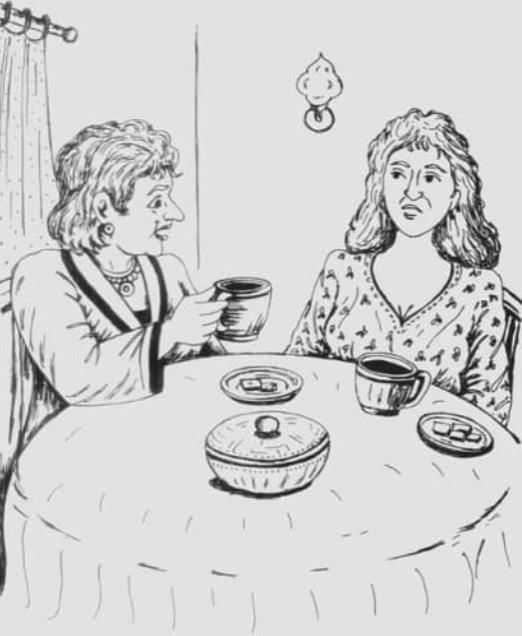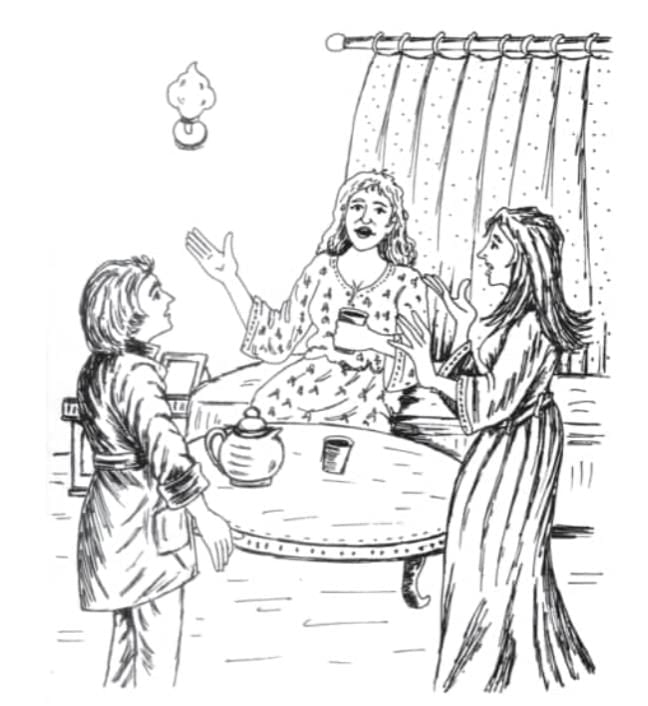Mother's Day Class 11 English Snapshot
| Table of contents |

|
| Key Points of the Story |

|
| Detailed Summary |

|
| Theme/ Message |

|
| Difficult Words |

|
Key Points of the Story
- The play "Mother's Day" by J.B. Priestley is set in the living room of the Pearson family's home in a London suburb.
- Key characters include Mrs. Annie Pearson, her husband George, and their children Doris and Cyril, along with Mrs. Fitzgerald, a neighbour.
- Mrs. Pearson feels overworked and underappreciated in her family. She is often treated like a servant by her husband and children.
- Mrs. Fitzgerald, a strong-willed neighbour, encourages Mrs. Pearson to stand up for herself and take control of her family life.
- Mrs. Fitzgerald suggests they swap personalities through a magical ritual, allowing Mrs. Pearson to experience life as a more assertive person.

- After the personality swap, Mrs. Pearson becomes bold and confident, showing her family that she will no longer be treated poorly.
- Doris and Cyril, upon encountering this new version of their mother, are surprised and confused by her assertiveness.
- George, Mrs. Pearson's husband, is also taken aback by her sudden change in demeanour, which leads to a humorous confrontation.
- The play explores the dynamics of family relationships and the often unrecognised contributions of mothers.
- By the end of the play, Mrs. Pearson gains the respect of her family and asserts her needs, suggesting a new, healthier family dynamic.
Detailed Summary
Main Characters
Mrs. Annie Pearson – A gentle and loving mother who is not respected by her family.
Mrs. Fitzgerald – Her bold and assertive neighbour, who is also a fortune teller.
Doris Pearson – Mrs. Pearson’s demanding daughter.
Cyril Pearson – Mrs. Pearson’s indifferent and selfish son.
Mr. George Pearson – Mrs. Pearson’s self-centred husband.
Introduction
Mrs. Pearson is having a conversation with her neighbour, Mrs. Fitzgerald, about how unappreciated and overworked she feels. Her family takes her for granted and treats her like a servant.
Mrs. Fitzgerald's Advice
Mrs. Fitzgerald advises Mrs. Pearson to be more assertive and stand up for herself. She suggests that if Mrs. Pearson wants respect, she must stop being overly obedient and start demanding fairness.
The Magic Switch
To help Mrs. Pearson become bold, Mrs. Fitzgerald proposes a magical solution: they switch personalities. Through a chant, they exchange their behaviours—Mrs. Pearson becomes confident and outspoken, while Mrs. Fitzgerald takes on Mrs. Pearson’s timid nature.
Reactions from the Family
Doris’s Shock: Doris is stunned when her mother refuses to iron her dress and speaks to her firmly.
Cyril’s Confusion: Cyril is surprised when he finds no tea ready and is told to serve himself.
Mr. Pearson’s Realisation: Mr. Pearson is shocked when his wife tells him that his friends laugh at him at the club. He begins to see her differently.
The Transformation
The family is unsettled by the change in Mrs. Pearson’s attitude. They start to realise how much they have taken her for granted.
Returning to Normal
Mrs. Fitzgerald returns and switches personalities with Mrs. Pearson again. However, Mrs. Pearson decides to continue being stronger and more confident in her role at home.
Conclusion
To bring the family together, Mrs. Pearson suggests playing a family game. The family agrees, showing signs that they will now treat her with more love and respect.
Theme/ Message
Theme
- The play explores the theme of maternal sacrifice and the struggle for recognition within the family.
- It highlights the importance of self-assertion and the need for individuals to stand up for their rights and needs.
- The contrast between Mrs. Pearson and Mrs. Fitzgerald showcases different approaches to gaining respect in family dynamics.
- The play illustrates how societal expectations can undervalue the role of a mother in a family.
Message
- The message of the play is that mothers deserve respect and appreciation for their hard work and contributions.
- It encourages individuals to assert themselves and communicate their needs clearly to family members.
- The play suggests that change is possible when individuals are brave enough to confront their circumstances.
- It reminds viewers that humour can be an effective tool in addressing serious issues within family relationships.

Difficult Words
- Assertive: Confidently self-assured and able to express one's opinions and needs.
- Pompous: Affectedly grand, solemn, or self-important.
- Dynamic: Characterised by constant change, activity, or progress.
- Undervalued: To be regarded as less important or less valuable than one actually is.
- Confrontation: A face-to-face meeting or conflict between opposing parties.
- Humorous: Funny or amusing; able to provoke laughter.
- Suburban: Relating to or characteristic of a suburb, which is a residential area on the outskirts of a city.
- Fortune-teller: A person who claims to predict the future, often using cards or other methods.
- Sinister: Giving the impression that something harmful or evil is happening or will happen.
- Fluttering: Moving quickly and lightly, often in a nervous or excited manner.
- Contrasting: Showing differences when compared.
- Apprehensively: In a manner that shows fear or anxiety about the future.
- Overworked: Having too much work to do; feeling tired from excessive work.
- Sacrifice: The act of giving up something valued for the sake of something else regarded as more important.
- Self-importance: An exaggerated sense of one's own value or significance.
|
73 videos|598 docs|80 tests
|
FAQs on Mother's Day Class 11 English Snapshot
| 1. What is the history behind Mother's Day? |  |
| 2. When is Mother's Day celebrated in different countries? |  |
| 3. How can I show my appreciation for my mother on Mother's Day? |  |
| 4. Are there any traditional symbols associated with Mother's Day? |  |
| 5. What are some popular Mother's Day gift ideas? |  |
















